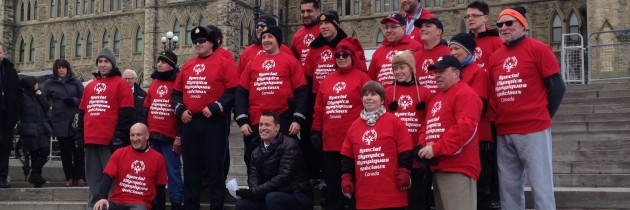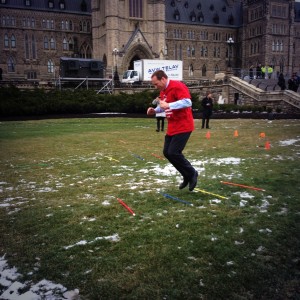Special Olympics athletes race parliamentarians to the finish line
By Ariana Armstrong and Kiran Rana
It was a dash to the finish line as Special Olympics athletes raced against senators and Ministers of Parliament in an obstacle course set up on the lawn of Parliament at noon on Tuesday.
The sporting event was part of Special Olympics Canada’s second Hill Day, which is held to lobby the federal government for increased funding for sport programs catered to children, youth, and adults with intellectual disabilities. The event also gave MPs and senators a chance to engage with Special Olympics athletes in a fun environment.
Before the event began, Special Olympics athlete Caroline Joanisse said she felt good about the upcoming race.
“I’m here to compete against the politicians,” Joanisse said. “I’m fast on my feet.”
Sharon Bollenbach, senior vice president of sport and strategic initiatives for Special Olympics Canada, said that approximately 70 Special Olympics Canada representatives from across the country were meeting with MPs and senators in 133 meetings throughout the day.
Bollenbach said Special Olympics Canada currently receives $2.8 million from the federal government but is asking for an increase in funding of $10.7 million over four years. She said this funding would enable Special Olympics Canada’s grassroots programs to support more athletes, volunteers, and programs, as well as buy more equipment and pay for facility rentals.
“Right now as an organization we reach about five per cent of people with intellectual disabilities that could be part of our programs,” Bollenbach said. “We really want to make sure that we can reach more athletes and make sure that more athletes are benefitting from sport.”
Bollenbach said that any additional government funding would be distributed among the organization’s 12 provincial and territorial chapters to help with grassroots programming.

Christian Schofield (basketball, swimming and bowling), Jacob Mathews (swimming and snowshoeing) and Callum Mackenzie (wrestling).
“Special Olympics happens every single day,” she said. “We’re very much a grassroots organization, so any day of the week in big communities and little towns you can find a Special Olympics program happening at a skating rink, a swimming pool, a soccer field.”
Bollenbach said that additional funding would also help with recruiting and training Special Olympics Canada volunteers.
“We have almost 36,000 athletes registered across the country and supporting those athletes is a small army of volunteers—there’s about 16,000,” she said.
According to the Special Olympics Canada website, the Special Olympics was founded in the United States in 1968 to provide access to sport to individuals with intellectual disabilities.
The first Special Olympics national competition was held in Toronto in 1969 and attracted 1,400 Canadian athletes. Today, over 35,000 children and adults are registered with Special Olympics Canada and the organization has chapters across the country, with competitions held at the provincial, national, and international levels.
The first Hill Day took place in 2010, and Bollenbach said the organization is hoping to hold one every two years.
Bal Gosal, Minister of State for Sport, said that the main goal of Hill Day is to raise awareness for Special Olympics Canada and their programs.
“It is very important to come out and play sports. That builds confidence in these kids,” Gosal said. “They become confident, they become healthy, they excel in education.”


